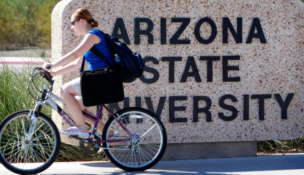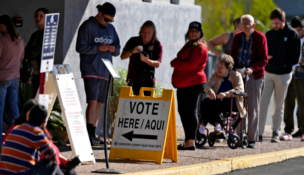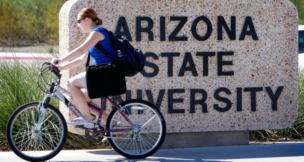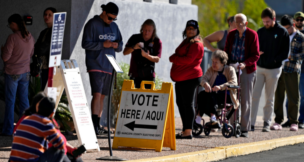Gov. Hobbs looking to 2026 for action on housing, water and education
Reagan Priest Arizona Capitol Times//July 19, 2025//
Gov. Hobbs looking to 2026 for action on housing, water and education
Reagan Priest Arizona Capitol Times//July 19, 2025//
Key Points:
-
Governor believes this year’s session was successful
-
Law enforcement pay, urban groundwater and budget shortfalls
-
Some of Hobbs’ priorities still unaddressed
With Arizona in its third year of divided government, Democratic Gov. Katie Hobbs was forced once again to work alongside the Republican-controlled Legislature to advance her policy and budget goals. Despite months of contention, the governor managed to eke out a few wins.
Despite uneasy compromises, Hobbs told the Arizona Capitol Times that she thought the 2025 session was particularly productive, and even hailed the recently passed $17.6 billion budget as “the most successful budget we’ve had” in her time as governor.
“I’m really focused on what we did get done…” Hobbs said. “There’s certainly a lot we can build on.”
The governor cited approval of emergency funding for the Division of Developmental Disabilities, a process which included nearly a month of heated negotiations with Republicans, partisan attacks on her fiscal responsibility, and a mini-crisis which nearly halted payments to parents of children with disabilities, as her best day of the session.
Her office also touted a few more legislative victories, including the passage of an Ag-to-Urban groundwater bill, a bipartisan compromise on foreign adversaries owning land in the state, a funding bill for the Arizona Diamondbacks stadium and legislation allowing local company Axon to build its new headquarters in Scottsdale.
But Hobbs and legislative Democrats failed to make progress on several key priorities, like oversight for the Empowerment Scholarship Accounts Program and the repeal of several unenforceable abortion restrictions still in law after voter approval of Prop. 139. Those areas were both outlined in the governor’s State of the State speech in January, but did not see any movement.
Hobbs’ office proposed an income cap on the ESA program to reduce its cost, but that provision wasn’t implemented via legislation or through the budget. Hobbs said she isn’t planning on giving up on reform for the program and will come back to the table with similar ideas in 2026.
The session also lacked meaningful legislation in the areas of affordable housing and rural groundwater management, though not for lack of trying on both the part of the governor’s office and the Legislature. Hobbs said conversations in those areas stalled late in the session and have not yet picked back up.
The governor also signed several bills that put her at odds with her own party members and activists who have argued she capitulated to right-wing interests. The two most contentious bills for fellow Democrats involved a public utility company financing measure and an age verification requirement for explicit online content.
“Certainly a lot of legislation is political, and I certainly don’t think about it through that lens,” Hobbs said. “I’m looking at what’s going to address issues that Arizonans are concerned about.”
The governor did score wins in budget negotiations and secured funding in many of the areas she outlined in her executive budget proposal. However, due to the size of the state’s revenue streams and uncertainty at the federal level, many of her initiatives did not receive nearly the amount of funding she proposed.
The bipartisan budget included funding for law enforcement raises, drug smuggling and human trafficking prevention at the southern border, expanded child care access, the DDD program and Colorado River litigation. But it didn’t extend the Low Income Housing Tax Credit or provide nearly as much funding as Hobbs proposed for housing initiatives.
“When we first passed the Low Income Housing Tax Credits, that had bipartisan support and we really need a Republican champion to get that done again,” Hobbs said. “I’m not sure why it wasn’t there this session.”
The final budget also left out smaller, niche proposals the governor included, like $7 million in funding for the University of Arizona to speed up efforts to return the remains of Native American ancestors to their tribes.
The governor also made headlines this session for implementing her first-ever bill moratorium during the funding battle for the DDD program and for setting a new state veto record. Hobbs said she hopes both moves show Republicans that she means business when it comes to standing up for Arizonans.
Hobbs did score some wins in another area: director nominations. Twelve of her nominees to lead state agencies were confirmed this session after many faced difficulties in the Senate in 2023.
She still has six director positions to fill after several were rejected by the Senate or its Director Nominations Committee or withdrawn because they would not be confirmed. Hobbs said, “it continues to be frustrating” that the confirmation process will extend into the final year of her first term as governor.
Both Hobbs and the Legislature will have a lot to focus on when the body reconvenes in January 2026, including Proposition 123 funding and federal Medicaid cuts. And they will do it all while staring down the barrel of the midterm election season, during which Republicans hope to oust the governor.












































